

 |
||
 |
||
Vol. 6 (1): June 2003 |
Download this page
|
|
Bulgaria / Cyprus / Greece / Italy / Madeira / Mauritania and Western Sahara / Turkey
Turkey
|
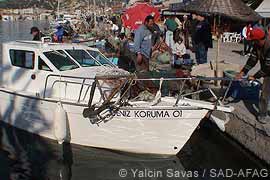 |
|
|
The new, purpose-built patrol boat for Aydincik. |
Drawing on experience gained from guarding activities within the Foça Specially Protected Area, a new patrol boat has been built for the important monk seal coasts of Aydincik in the Cilician Basin.
Purchased through the AFAG-WWF SMAP initiative, [see Coastal zone management project commences, TMG 5 (1): May 2002], the patrol boat will be operated in cooperation with the Local Governorship, Fisheries Cooperative and SAD-AFAG.
The boat, named “Deniz Koruma 01” (Marine Conservation 01) will be operational within a few months, manned by local guards who have previously undergone training in the Foça SPA. – Harun Güçlüsoy, SAD-AFAG.
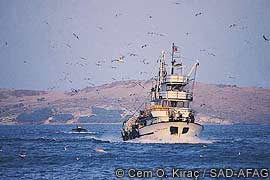 |
|
|
Trawlers condemned in Mersin. |
On 6 February 2003, SAD-AFAG participated in the Mediterranean Region Fishery Consultancy Committee Meeting – held in Antalya and organised by the Ministry of Agriculture and Rural Affairs – where many issues were discussed that have an important bearing on the survival of the monk seal and its marine ecosystem. The most important result of the meeting was the banning of the Turkish lampara fishery (a form of night purse-seine fishing – girgir in Turkish, gri-gri in Greek – utilising powerful lights) along the Cilician Basin coasts, from Anamur (Mersin) to the Syrian border. – Ahmet Bolat, SAD-AFAG.
Last November we received distressing reports of monk seal deaths on two occasions. The first incident occurred at Çesme’s Altinyunus Marina, on Turkey’s northern Aegean coast. A subsequent autopsy on site indicated that the animal – a pup born during the same year – had drowned [see Snared and drowned, TMG 4 (1): May 2001].
Before even recovering from the shock of this incident, we received word that a dead adult female seal had been found by wardens within the Aydin (Dilek Peninsula) National Park. The mammary glands of the seal were still full, leading us to believe that an orphaned seal might still be in the area. Despite strenuous efforts, however, the pup could not be found.
As the Park lies adjacent to the Greek islands we also contacted MOm rescue staff in Athens, in the hope that the organisation’s Rescue Network might find the animal. Sadly, no news of the pup was ever received, possibly suggesting that it, too, had died.
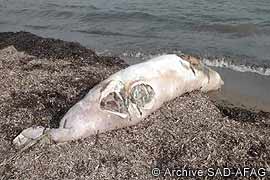 |
|
|
The adult monk seal killed on the Karaburun Peninsula. |
Another sad event occurred in January 2003, when a dead adult seal was found in Karapinar on the Karaburun Peninsula, adjacent to the Foça Specially Protected Area. A subsequent necropsy revealed that she had been killed. Immediately after the incident, an investigation was mounted by AFAG staff, Gendarmerie officers and Urla public prosecutors in an effort to trace the culprits.
Sufficient evidence was gathered to implicate 4 fish farm operators in the crime. The men were accused (file no. 2003/175) by prosecutors and were requested to pay the set penalty within 10 days (€200 from each of the accused). Since the accused reject the charges against them, however, and have failed to meet the fine, they will now face trial in public court. If found guilty, the penalty for each will rise to €400, plus a €4000 administration fine. AFAG’s staff are following the case. – Harun Güçlüsoy & N. Ozan Veryeri, SAD-AFAG.
The following progress has been made within our EU-funded project, “Conservation and Management of Biological Hot Spots – Forming a Mediterranean Network”:
Mangement plans: As detailed in the previous issue of TMG [see Progress reported in coastal zones project, TMG 5 (2): November 2002], detailed coastal zone management (CZM) plans have been prepared for Foça-Yeni Foça-Karaburun in the Aegean and Aydincik in the Cilician Basin, and were submitted to the Ministry of Environment in December 2002 (2 of 5 “Important Monk Seal Sites” selected by the National Monk Seal Committee).
However, since the new government in Turkey plans to combine the two current ministries of Forestry and Environment, the meeting scheduled in March 2003 in Ankara – a meeting that had been expected to advance the conservation process considerably – has been postponed indefinitely.
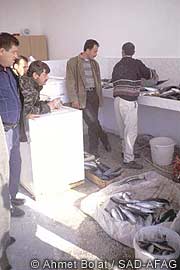 |
|
|
Fishermen in the new Aydincik Fishing Cooperative. |
Third NFZ in the Cilician to be proposed: Prior to the Aydincik Fishing Cooperative Meeting on 11 March 2003, bilateral talks and discussions on the importance of No-Fishing Zones (NFZs) for the recovery of depleted local fish stocks were held with a majority of the artisanal fishermen in Aydincik.
At the meeting, organised in the Cooperative’s office, two provisional NFZs were identified by consensus at Kucuk Island and Sapli Island off Aydincik. The former is an important breeding site for Audouin’s gull while the latter also incorporates an important monk seal cave. The creation of NFZs at these sites will soon be officially recommended by AFAG and the Aydincik Fishing Cooperative to the Advisory Group of the Ministry of Agriculture and Rural Affairs.
Aydincik Fishing Cooperative is now active: As an integral part of the AFAG project, which seeks to bring local fishermen into the conservation process, aid was provided to the Aydincik Fishing Cooperative. A 500 litre deep freeze and office equipment was provided through AFAG, while the premises are being made available rent-free by Aydincik Municipality. The Cooperative office, which officially opened its doors on 11 March, is already acting as a much-needed meeting place and interactive focal point for the local fishermen. – Harun Güçlüsoy, SAD-AFAG.
The Foça SPA patrol boat Cevre was “beached” between October 2002 and April 2003 because funds to cover engine maintenance and repair costs could not be found.
As a result of considerable effort by AFAG, involving bilateral talks and correspondence with the relevant government offices, the required funds were finally obtained from the Izmir Environment Foundation (4 billion TL, approximately €2,250), the Municipality of Foca (1 billion TL), the Local Council of Foça (0.5 billion TL) and the Foça Fishing Cooperative (0.5 billion TL).
It is especially noteworthy that this is the first time that the Fishing Cooperative has contributed to Cevre’s service costs.
The ultimate goal, if possible, is to cover all these expenses through the Cooperative.
For further repair of the boat, AFAG also contributed 1 billion TL, renewing the vessel’s seats and electrical system.
A windscreen, a new battery and oil tank will also be added. – Harun Güçlüsoy, SAD-AFAG.
Club Salima, Antalya, has become an official sponsor of AFAG’s bulletin Akdeniz Gezgini (Mediterranean Voyager).
Now in its 15th issue, the quarterly bulletin is distributed to around 1500 stakeholders in Turkey and abroad. AFAG gratefully acknowledges Club Salima’s contribution. – Yesim Caglayan, SAD-AFAG.
The first phase of an ecotourism experiment, designed to test the suitability of a sustainable Mediterranean monk seal conservation model in the Cilician Basin, Turkey, has been successfully accomplished [see Cilicia on my Mind, this issue].
Our team in the Cilician Basin (Mersin) is running a conservation project that focuses on the ecological and socio-economic importance of a Marine Protected Area created for the conservation of the Mediterranean monk seal.
The Kizilliman MPA covers a very large area (16x12 nautical miles) that is off-limits to large-scale fisheries, and also incorporates a network of small, no-take-zones established in front of the monk seal breeding caves. On land, a 75 km coastal band has also been set aside by the Ministry of Culture as a 1st degree natural asset, offering effective terrestrial habitat protection [see Cilician Basin responding to treatment, TMG 3(2): 2000]. One of the major aims of the ongoing conservation project, sponsored by the United Nations Development Program GEF/SGF, is to create a sense of ownership for the MPA, especially among local artisanal fishermen.
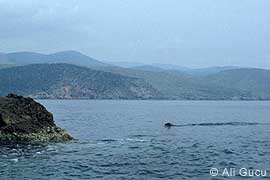 |
|
|
Cilician seal sighting. |
Anticipating the potentially negative consequences that might arise by imposing restrictions upon the activities of local people living around the MPA, we consider it of utmost importance to address economic losses created by such regulations, and to investigate supplementary or alternative sustainable economic solutions that will compensate for their losses and thus avoid future pressure on the recovering ecosystem.
Many examples from around the globe indicate that, if local people can gain sufficiently from the sustainable use of such MPAs, they would be less likely to exploit the already over-fished ecosystem, and would be more likely to protect their asset for the future. In monk seal conservation, there are only very few alternatives available that could involve local people as constructive partners in protection practices, while also generating sufficient revenues to be economically viable.
One is ecotourism, in which local communities benefit from nature conservation in many areas around the world.
In this context, and by carefully researching the available natural, scenic, historical and accommodation resources in and near the critically endangered Mediterranean monk seal habitat, a trial ecotourism initiative was launched last year. The ecotourists who took part in the trial were a special group organised by our partners in this initiative, the Italian Gruppo Foca Monaca, and whose primary incentive was to support the conservation of the monk seal as implemented in the Kizilliman marine protected area.
The main aims of the trial were:
Bearing in mind that the ultimate aim of the programme is to secure the survival of the critically endangered monk seal and its habitat, and in order not to increase the existing human pressure on the species, more diverse ecotourism resources were investigated and an inventory of alternative ecotourism products was prepared. As such, the species was used more as a symbol rather than as the “product” itself, with natural landscapes, other wildlife, people, archaeology and the protected area as a whole forming the entire ecotourism package.
The experimental trip took place between 25 October and 3 November 2002.
In total, eight enthusiasts joined the tour, led by the Gruppo Foca Monaca’s Dr. Luigi Guarrera, who is also one of the initiators of the ongoing Cilician seal conservation project.
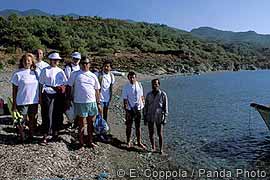 |
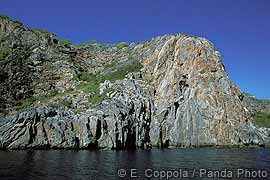 |
|
|
Participants of the first phase. |
Cilician coastline. |
Our first impression after the experimental trip is that, if small groups of up to ten people continue to visit the Kizilliman MPA area on a regular basis in the off-season months – under the organization and supervision of the conservation project – this might provide a working model for government agencies and the managers of protected areas to undertake the legal adjustments necessary to achieve an effective ecotourism infrastructure.
Legal definitions and the status of Marine Protected Areas, as well as pertinent ecotourism legislation could be developed simultaneously, and the process hastened by the availability of a working model. To start the ball rolling, following the completion of the trial tour in the Cilician MPA, a letter highlighting the need for such ecotourism legal definitions was sent to the relevant Ministries, and the Coast Guard Headquarters.
The next step of the experiment is to involve local guides during the forthcoming tour, planned for 24 October to 2 November 2003. The aim is to encourage community involvement and a sense of ownership for the MPA. The training will focus on managing and minimizing visitor impacts on wildlife, environment and culture; with education focusing on the concepts of ecotourism, as well as drawing on lessons learnt during the first experimental trip. We hope that ecotourism will prove an effective tool in ultimately reaching that point where the habitat will accommodate both the monk seal and its human populace in peace. – Ali Cemal Gucu and Gul Gucu, IMS/METU.
For information about the next ecotourism expedition to the Cilician Basin, please write to Gruppo Foca Monaca at grupfoca@tin.it or visit the web site www.focamonaca.it.
Gucu, G. and A. C. Gucu. 2003. Is ecotourism an appropriate tool to ensure sustainable Mediterranean monk seal conservation in the Cilician Basin, Turkey? Evaluation report of the experimental Eco-tourism application in Bozyazi – Mersin. Middle East Technical University Institute of Marine Sciences: 1-33. [Available in the Monachus Library]
Guarrera, L. 2003. Cilicia on my Mind. TMG Guest Editorial, this issue.
NET WATCHMass tourism versus monk seals...“Tourist development also poses a major threat, as was the case at the Asprokremnos coast on the Akamas, where monk seals had bred in caves until they were driven away by explosions. The blasts were carried out, illegally, to make space for a massive hotel complex, the Ecological Movement said. Along with turtles and dolphins, the monk seal has been a protected species since 1971, and anyone found trying to kill or catch one can be fined £5,000 and/or spend six months in jail.”
|
Copyright © 2003 The Monachus Guardian. All Rights Reserved |